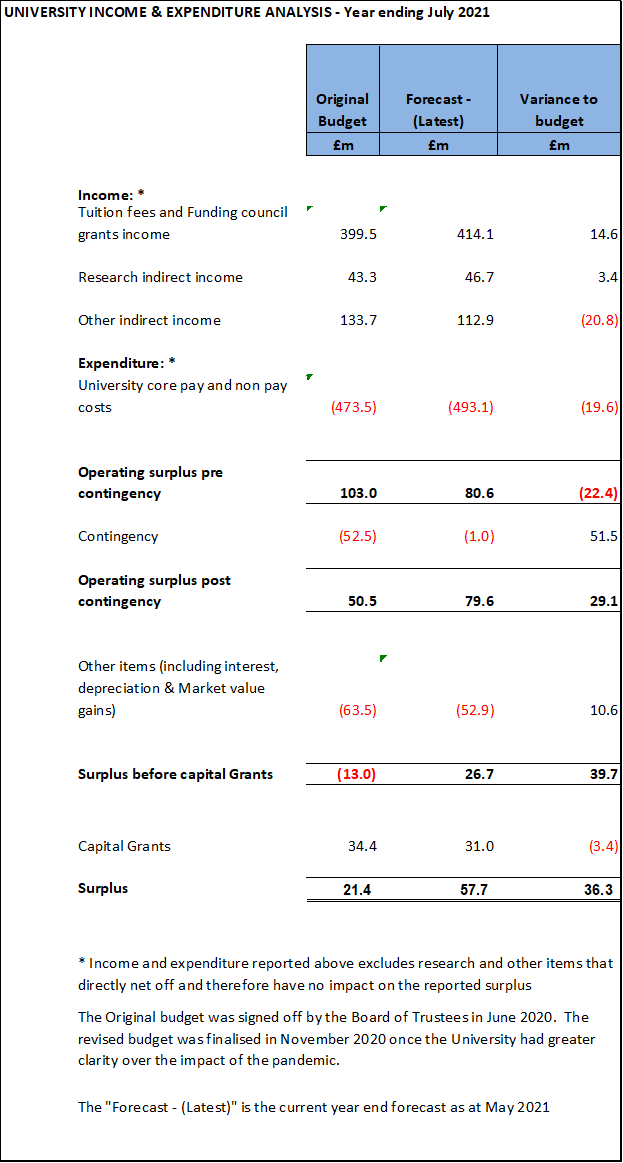We are fast approaching our financial year-end on 31 July and working to close our accounts from 2020/21. Ahead of this, our budget for the 2021/22 academic year was recently approved by the Board of Trustees. This provides the resources needed to power our education and research over the coming year, support us to achieve our wider ambitions, and safeguard the University’s long-term academic mission and financial sustainability.
Budget: 2021/22
Our institutional response to Covid remains a prominent theme underpinning next year’s budget, with the potential of future waves still posing significant risk to both our income and expenditure. The impact is both direct (reduced income and increased costs) and indirect (significant pressure of public spending leading to funding cuts).
Our experience in 2020/21 is that c40% of combined budgeted income from supporting services (student accommodation, sports, catering and events) may not be achieved. There are also some downside risks to some areas of student recruitment. Based on our operating experience and the continued expectation of income shortfall as a consequence of COVID-19, a contingency budget of £34m has been included to manage the ongoing pandemic.
Moving forward, we need to continue to balance effective financial stewardship of our University in the near term, with building capacity to fulfil our academic mission in the medium to long-term. This requires investment in our academic community, Professional Services and facilities. To support this, the budget provides for an additional 154 core funded academic roles and 73 Professional Services roles for 2021/22, compared to our current year resourcing levels.
The collective efforts of the whole University community has had a huge impact on how we are able to move forward positively into our next academic and financial year.
Looking back at our 2020/21 budget
The table below summarises the main movements in our forecast for this year compared to the budget we set ourselves. Overall, our financial position remains healthy. We are forecasting a surplus before Capital Grants of £26.7m for this financial year. This surplus will help pay for our investment in new roles, the IT Digital Strategy, facility improvements and other projects such as a new community dental facility that will transform our dental education.

Income
Our forecast income from tuition fees and funding council grants has increased notably since our original budget. We have seen an 8% growth in total student population and withdrawals have not been significantly higher than previous years; as a result, this income is currently forecast to be £414.1m (£14.6m higher than originally budgeted). We appreciate the substantial efforts that colleagues made to accommodate higher than planned undergraduate entrants than we had planned. It was important to us to give young people the choice as to whether they wanted to commence study this year or defer due to the limited other options available to them.
‘Research indirect income’ is also higher at £46.7m, despite the recently announced reduction in UKRI Official Development Assistance (“ODA”) grants. This reflects both the strength of new grant applications being made and some work that we could not undertake last year due to lockdown restrictions being deferred into the current year.
The University’s ‘other indirect income’ stream has been most adversely impacted over the last year, which is now forecast to total £112.9m (over £20m less than originally budgeted). This is principally due to the rent rebates and early tenancy releases that we have offered to students in University allocated halls. We have considered it fair to offer substantial financial support to those in halls, which is amongst the most generous in the sector. Students who have not wished to return to campus since early January have not had to pay any rent.
Sports and catering income has also come under pressure this year due to restrictions and lower footfall on campus.
Expenditure
The University expenditure is forecast to be £493.1m – £19m more than originally budgeted. There have been significant additional costs during 2021/22 to effectively manage the impact of COVID-19 on our learning and research. This spend relates to the support we have offered our students in halls, delivery of blended learning, personal protective equipment and additional resource to support cleaning and security activities. As we get closer to the end of the financial year, all areas have been assessing remaining budgets and likely timing of spend and revising forecasts accordingly.
As we have progressed through the year, our contingency budget has significantly reduced with £1m remaining. This reflects the level of residual risk we see for the current year and primarily relates to the recovery of student debt, which is running at higher levels than in previous years.
Planning for the future
This past year has not been without considerable challenges for our whole sector, but by taking early action and pausing non-essential spend and other commitments, we have so far been able to manage the uncertainty of the pandemic well and continue to be in good shape to invest in people and our strategic plans.
We are now reviewing our Vision and Strategy, ensuring we account for the dramatic changes in the external environment seen in recent years, and are well placed to build on progress since 2016. I encourage you to get involved in the review by joining the remaining live streams and sharing your thoughts and ideas via the strategy consultation form.
If you have any questions, please don’t hesitate to contact me at coo@bristol.ac.uk
